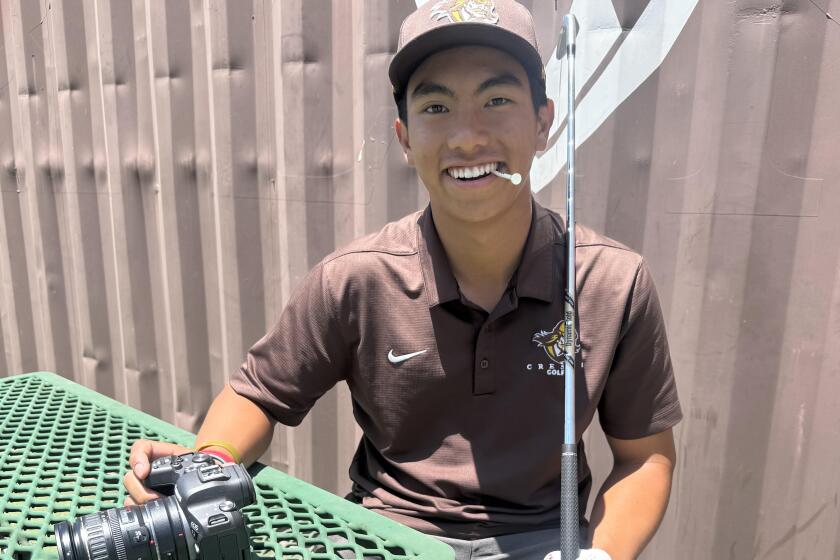Hornets Have Been Stung by Pile of Losses
- Share via
NEW ORLEANS — Byron Scott shook his head and smiled incredulously, brushing off the suggestion that some intangible external force was working to bring down the New Orleans Hornets.
“No, because that means you believe in voodoo or something else, and I don’t believe in that stuff,” Scott said.
But voodoo does have a celebrated history in this city, and the decline of the Hornets since their arrival here three seasons ago conjures images of someone relentlessly sticking pins in a doll of team owner George Shinn.
Even Scott acknowledged that a streak of hard-luck injuries and related setbacks this season have far exceeded what he could have imagined when he agreed last May to take over as head coach.
With only two victories in their first 28 games, the Hornets are on pace to break the NBA’s futility record, set by the 1972-73 Philadelphia 76ers, who finished 9-73.
It’s gotten so bad for the Hornets that 13-year veteran Jim Jackson refused to show up this past week when acquired in a trade, choosing instead to wrack up tens of thousands of dollars in fines. Jackson’s move comes after recent All-Stars Baron Davis and Jamaal Magloire said before the season that they wouldn’t mind being traded, and then both were injured after a handful of games.
“I don’t think anybody would have imagined this,” Scott said. “You can’t imagine, out of your top eight or nine players, having five of them gone at the same time.”
The Hornets have been more competitive than their record indicates -- 15 of their 26 losses have been by single digits, and four came in overtime.
New Orleans’ play should improve with Davis’ recent return. Also due back shortly are Rodney Rogers and David West, while Magloire could return by mid-February from a dislocated and broken finger.
Former All-Star Jamal Mashburn, however, might not return from his knee injury. And given the pattern of this and recent seasons, it would be foolish to assume the rest of the team will return to full health and remain that way.
“This team has always been kind of jinxed. We’ve always had guys hurt -- major guys -- even when we were in Charlotte,” veteran forward P.J. Brown said, recalling Mashburn’s bout with a mysterious virus that caused positional vertigo during the 2001-02 playoffs.
The Hornets’ arrival in New Orleans for the 2002-03 season was supposed to mean a fresh start for Shinn and a world of potential for a franchise with novel appeal and the type of modern stadium that voters and politicians in North Carolina refused to grant to Shinn’s team.
Coming off a second-round playoff exit and with Mashburn back, there was talk of possibly reaching the NBA Finals -- even though a postseason game had never been played in New Orleans in the years the Jazz played there. Once the playoffs arrived in town, things immediately went wrong. Davis hurt his knee in Game 1 of the opening round series, and Mashburn fractured a finger in Game 2. Philadelphia won the series in six games.
Last season, under new -- and constantly embattled -- coach Tim Floyd, Mashburn’s potentially career-ending knee injury flared up. He played just 19 games. Davis and then-shooting guard David Wesley missed time with periodic injuries and the team finished 41-41, before another first-round-playoff exit, this time to Miami.
Since then, improving the team through free-agency has been difficult because Mashburn’s guaranteed salary of about $9 million, although insurance pays most of it, still counts against the team’s salary cap. The injury also makes him tough to trade.
Meanwhile, attendance, solidly in the middle of the league in the Hornets’ first season in New Orleans, has fallen off and is close to last in the league.
And it seems team officials fudged attendance figures in their final season in Charlotte, while inflating projections in New Orleans just to get league approval for the move, drawing an $8 million fine from the NBA. The fine reportedly would be forgiven if Shinn buys out minority owner Ray Wooldridge, who league officials blamed for the deception.
Despite all the problems, Shinn, at least publicly, has been a rock of optimism. He says the team -- thanks to a favorable arena lease, its cable TV package and sponsorship -- has made money. He also continues to say he loves his new home and is confident he can find a way to make the Hornets winners again.
Not all players are as down on the franchise as Davis and Magloire. Brown, a Louisiana native and member of the Hornets since 2000-01, points to the team’s more than decade-long stretch of .500 or better regular seasons, which appears certain to end this season.
“This organization has had a lot of success over the past 10 years,” Brown said. “What I’m thinking is, it’s one bad year. Some teams go through that. Orlando went through it last year. I’m hoping this is just one of those years and we can get out of it ... and forget this ever happened.”
More to Read
Go beyond the scoreboard
Get the latest on L.A.'s teams in the daily Sports Report newsletter.
You may occasionally receive promotional content from the Los Angeles Times.










